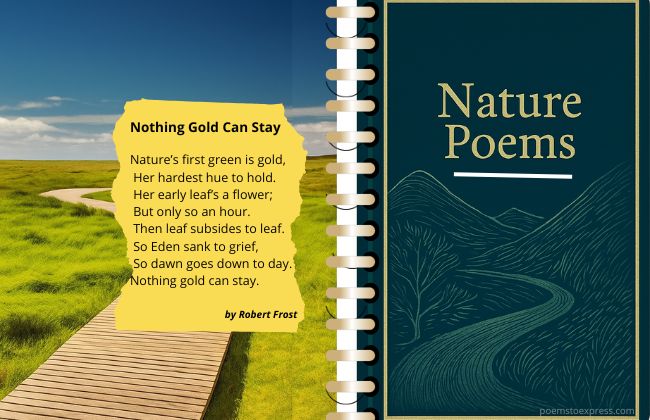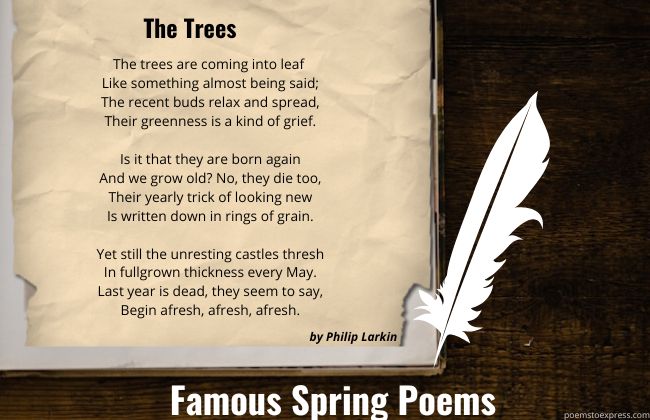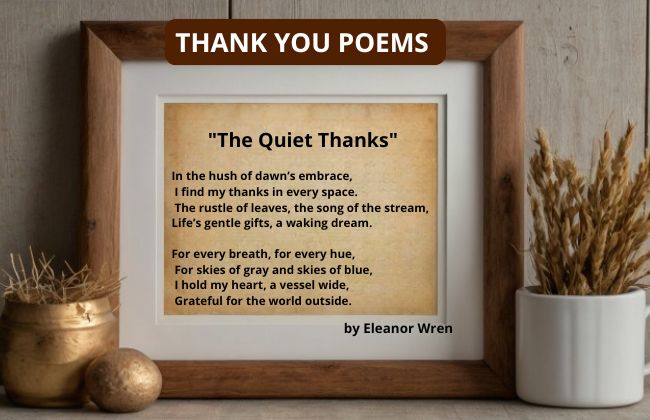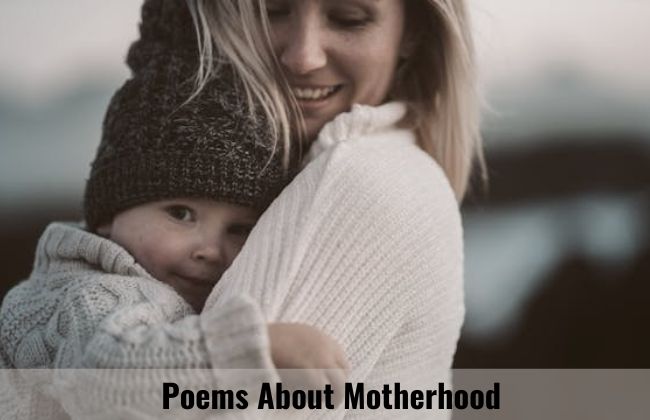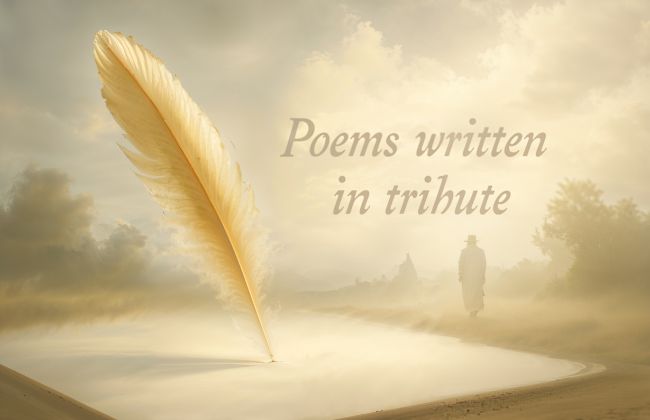Poetry and books share a profound connection; each serves as a muse to the other, inspiring literary creation and reflection.

Throughout history, poets have turned to the motif of the book as a symbol of knowledge, transformation, and escape.
From odes that celebrate the transformative power of reading to reflections forged between the reader and the book, poems about books are a testament to the deep imprint they leave on the souls of those who cherish them.
Their verses invite us to immerse ourselves in the fascinating world of literature, to explore new horizons, and to let ourselves be carried away by imagination.
In this post, we will share poems that pay tribute to books and explore the love of reading. Join us and discover the literary magic that unites poetry and books!
Table of Contents
- 1 1) “Marginalia” by Billy Collins
- 2 2) “A Book” by Emily Dickinson
- 3 3) “The Author to Her Book” by Anne Bradstreet
- 4 4) “Old Books Are Best” by Beverly Chew
- 5 5) “The Land of Story-Books” by Robert Louis Stevenson
- 6 6) “Ode to the Book” by Pablo Neruda
- 7 7) “Good Books” by Edgar Albert Guest
- 8 8) “When You Can Read” By Bobbi Katz
- 9 9) “Notes on the Art of Poetry” by Dylan Thomas
- 10 10) A Study of Reading Habits by Philip Larkin
- 11 Themes Explored in Poems About Books
1) “Marginalia” by Billy Collins
Billy Collins’ poem “Marginalia” illuminates the conversation between reader and text through the scribbles and comments left in the margins of pages.
Collins’ work explores the reader’s reaction to the author’s ideas, sometimes conflicting and animated.
His skillful articulation captures the essence of marginal notes as a blend of critique, admiration, and personal musings.
Sometimes the notes are ferocious,
skirmishes against the author
raging along the borde
rs of every page
in tiny black script.
If I could just get my hands on you,
Kierkegaard, or Conor Cruise O’Brien,
they seem to say,
I would bolt the door and beat some logic into your head.
Other comments are more offhand, dismissive -
“Nonsense.” “Please!” “HA!!” -
that kind of thing.
I remember once looking up from my reading,
my thumb as a bookmark,.. See full poem
2) “A Book” by Emily Dickinson
“A Book” by Emily Dickinson encapsulates the power of reading as a means of escape and exploration.
In her characteristic brevity, Dickinson employs the metaphor of a frigate—a ship designed for speed and agility—to illustrate how books transport readers to distant lands.
The verse implies that literature provides a journey accessible to everyone, regardless of financial means.
There is no frigate like a book
To take us lands away,
Nor any coursers like a page
Of prancing poetry.
This traverse may the poorest take
Without oppress of toll;
How frugal is the chariot
That bears a human soul!
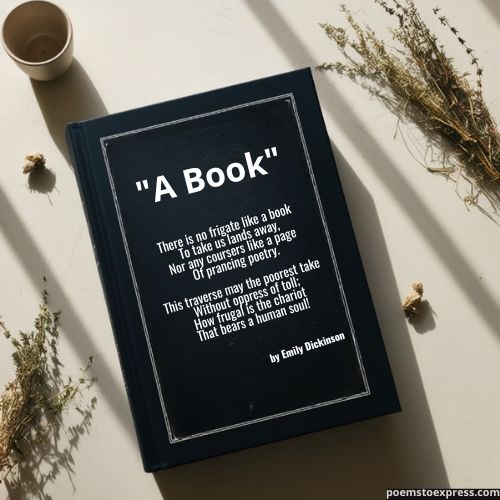
In ‘The Author to Her Book’ by Anne Bradstreet, the author explores her relationship with her own literary work, presented as an ‘ill-formed offspring’ of her wit.
The poem reflects Bradstreet’s insecurity and emotional conflict about the quality of her book, which was published without her initial consent.
Using extended metaphors, she compares the process of revising and improving her book to maternal care for a child, highlighting its perceived flaws and her struggle to perfect it.
Thou ill-form’d offspring of my feeble brain,
Who after birth didst by my side remain,
Till snatched from thence by friends, less wise than true,
Who thee abroad, expos’d to publick view,
Made thee in raggs, halting to th’ press to trudge,
Where errors were not lessened (all may judg).
At thy return my blushing was not small,
My rambling brat (in print) should mother call,
I cast thee by as one unfit for light,
Thy Visage was so irksome in my sight;
Yet being mine own, at length affection would
Thy blemishes amend, if so I could:
I wash’d thy face, but more defects I saw,
And rubbing off a spot, still made a flaw.
I stretched thy joynts to make thee even feet,
Yet still thou run’st more hobling then is meet;
In better dress to trim thee was my mind,
But nought save home-spun Cloth, i’ th’ house I find.
In this array ’mongst Vulgars mayst thou roam.
In Criticks hands, beware thou dost not come;
And take thy way where yet thou art not known,
If for thy Father askt, say, thou hadst none:
And for thy Mother, she alas is poor,
Which caus’d her thus to send thee out of door.
4) “Old Books Are Best” by Beverly Chew
The author highlights the connection between the reader and the story of books, where even the less perfect physical features of old books, such as worn printing or darkened paper, become part of their charm.
This poem reflects a deep appreciation for books that have been passed down through generations, suggesting that, despite modern advancements, old books retain an invaluable value.
Old Books are best! With what delight
Does “Faithorne fecit” greet our sight
On frontispiece or title-page
Of that old time, when on the stage
“Sweet Nell” set “Rowley's” heart alight!
And you, O Friend, to whom I write,
Must not deny, e'ndash though you might,
Through fear of modern pirates' rage,
Old Books are best.
What though the print be not so bright,
The paper dark, the binding slight?
Our author, be he dull or sage,
Returning from that distant age
So lives again, we say of right:
Old Books are best.
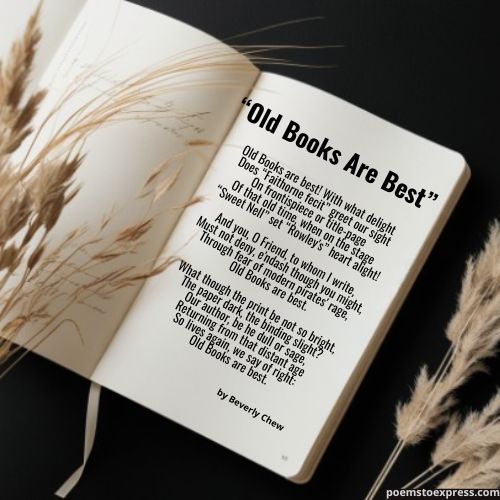
5) “The Land of Story-Books” by Robert Louis Stevenson
The Land of Story-books’ by Robert Louis Stevenson celebrates the power of imagination and the enchantment of the worlds created by literature.
Through the eyes of a child, the poem illustrates how books transform a familiar environment into a realm of fantastic adventures.
It highlights the ability of stories to transport young readers beyond their everyday reality into imaginative and exciting landscapes.
At evening when the lamp is lit,
Around the fire my parents sit;
They sit at home and talk and sing,
And do not play at anything.
Now, with my little gun, I crawl
All in the dark along the wall,
And follow round the forest track
Away behind the sofa back.
There, in the night, where none can spy,
All in my hunter's camp I lie,
And play at books that I have read
Till it is time to go to bed… See full poem
6) “Ode to the Book” by Pablo Neruda
In this poem, Neruda begins with the gesture of closing a book to open life, suggesting a transition from internal reflection to direct experience of the world.
Throughout the poem, he describes his preference for active life and direct experiences over the knowledge found in books, though he acknowledges the value of books as tools for imaginative adventures.
The poem celebrates life lived outside the pages, engaging directly with the world and its challenges.
When I close a book
I open life.
I hear
faltering cries
among harbours.
Copper ignots
slide down sand-pits
to Tocopilla.
Night time.
Among the islands
our ocean
throbs with fish,
touches the feet, the thighs,
the chalk ribs
of my country… See full poem
7) “Good Books” by Edgar Albert Guest
The poem highlights how books are always available to share hours of solitude or to offer comfort in difficult times, emphasizing the constant and unobtrusive nature of their companionship.
Through this poem, Guest expresses a deep appreciation for books, considering them friends that never fail and always enrich the lives of those who possess them.
Good books are friendly things to own.
If you are busy they will wait.
They will not call you on the phone
Or wake you if the hour is late.
They stand together row by row,
Upon the low shelf or the high.
But if you're lonesome this you know:
You have a friend or two nearby.
The fellowship of books is real.
They're never noisy when you're still.
They won't disturb you at your meal.
They'll comfort you when you are ill.
The lonesome hours they'll always share.
When slighted they will not complain.
And though for them you've ceased to care
Your constant friends they'll still remain.
Good books your faults will never see
Or tell about them round the town.
If you would have their company
You merely have to take them down.
They'll help you pass the time away,
They'll counsel give if that you need.
He has true friends for night and day
Who has a few good books to read.
8) “When You Can Read” By Bobbi Katz
When You Can Read’ by Bobbi Katz is a poem that celebrates the autonomy and new adventures that open up through reading.
It describes how the ability to read allows one to explore and learn about the world in both practical and playful ways.
This poem emphasizes how books are windows to experiences and knowledge that enrich everyday life, encouraging young readers to discover the power of reading to better understand the world.
When you can read, then you can go
from Kalamazoo to Idaho -
Or read directions that explain
just how to build a model plane -
Or bake a cake or cook a stew -
The words will tell you what to do!
When you can read, then you can play
a brand new game the proper way -
Or get a letter from a friend
and read it . . . to the very end!
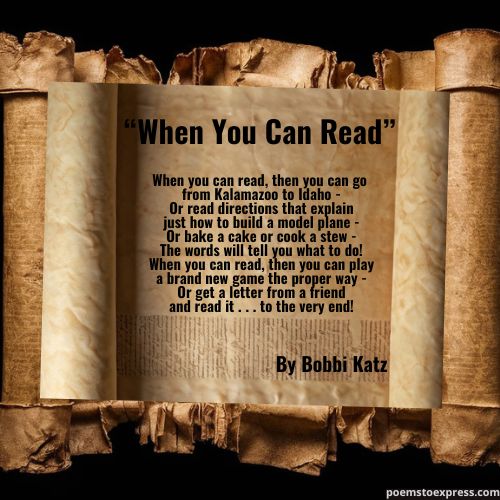
9) “Notes on the Art of Poetry” by Dylan Thomas
This poem expresses its fascination with the transformative power of the words contained in books. It highlights the ability of words to evoke vivid images and intense emotions, comparing them to natural phenomena such as sandstorms and blasts of ice.
The poem reflects the idea that within books, unexpected wonders occur, revealing the magic of reading and literary art.
I could never have dreamt that there were such goings-on
in the world between the covers of books,
such sandstorms and ice blasts of words,,,
such staggering peace, such enormous laughter,
such and so many blinding bright lights,, ,
splashing all over the pages
in a million bits and pieces
all of which were words, words, words,
and each of which were alive forever
in its own delight and glory and oddity and light.
10) A Study of Reading Habits by Philip Larkin
A Study of Reading Habits” by Philip Larkin explores the evolving relationship between the reader and books through different stages of life.
Initially, books serve as an escape and a means to enact fantasy roles. As the speaker matures, disillusionment sets in; books lose their magical quality and reveal more grim truths about life and oneself.
Ultimately, Larkin expresses a cynical view of reading as an ineffective escape from reality, mocking the notion that books can solve real-life problems or shape one’s identity in any meaningful way.
When getting my nose in a book
Cured most things short of school,
It was worth ruining my eyes
To know I could still keep cool,
And deal out the old right hook
To dirty dogs twice my size.
Later, with inch-thick specs,
Evil was just my lark:
Me and my cloak and fangs
Had ripping times in the dark.
The women I clubbed with sex!
I broke them up like meringues.
Don't read much now: the dude
Who lets the girl down before
The hero arrives, the chap
Who's yellow and keeps the store
Seem far too familiar. Get stewed:
Books are a load of crap.
Themes Explored in Poems About Books
The exploration of themes in poetry often reflects a deep affection for literature and the transformative experience of reading.
Poems about books frequently celebrate the emotional and intellectual connections readers establish with the printed word.
1. The Love for Reading
Engagement:
Poets articulate a passionate engagement with reading that transcends mere hobby. Emily Dickinson, in her poetry, compares a book to a frigate that takes one on intellectual journey, highlighting the love for reading as a means of traversing experience without financial burden.
Transformation:
This theme also encompasses the transformative power of books, proposing that reading can shift one’s perspective and mood profoundly.
Illustrations include moods swinging from joy to contemplation simply through engagement with a book’s content.
2. Books as Windows to Other Worlds
Escapism:
Books are often depicted as portals, offering escapism from the everyday world into realms of fantasy and untapped possibility.
The vivid imagery found within poems often mirrors the diverse landscapes and experiences books can offer, from sandstorms of emotion to the chill of ice blasts of words.
Perspective-Shifting:
Literature provides a framework for understanding experiences beyond one’s own life.
Poets use books as a metaphor for the vessel that carries the reader through the sea of knowledge and understanding, suggesting that through reading, one can gain insight into different cultures, times, and philosophies.
You might also like:

